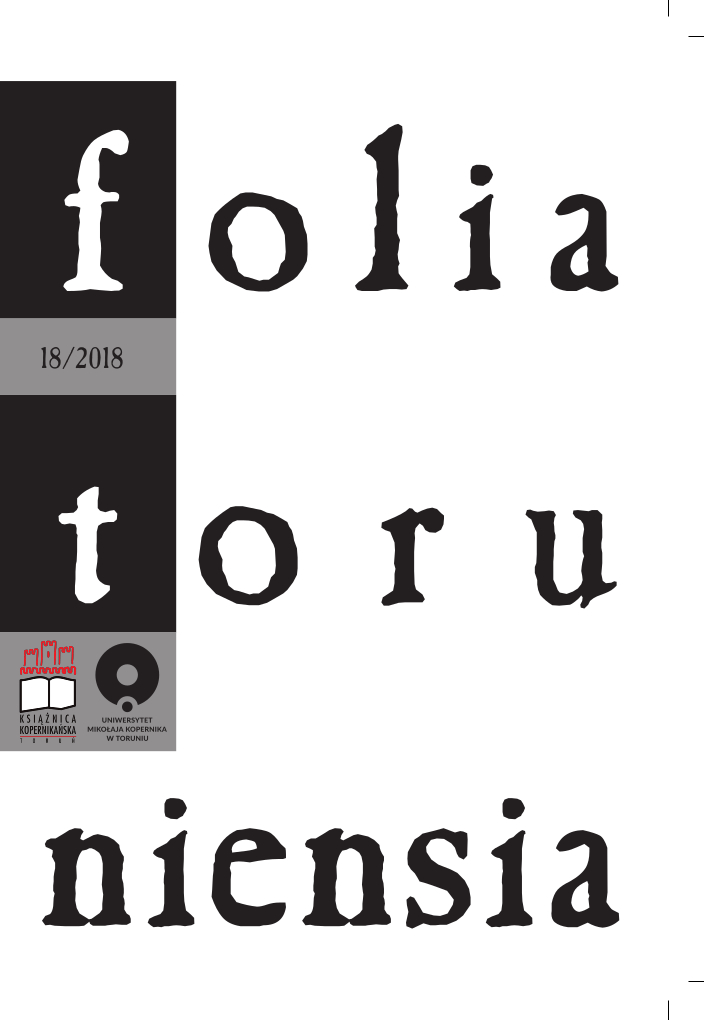Łaciński przekład rozprawki Pseudo-Arystotelesa Peri\ tw=n a)retw=n kai\ kakiw=n Franciszka Tidicaeusa, profesora Gimnazjum Akademickiego w Toruniu
DOI:
https://doi.org/10.12775/FT.2019.008Klíčová slova
filologia klasyczna, neolatynistyka, historia nauki, filozofiaAbstrakt
W artykule pod kątem językowym zostały omówione wybrane passusy z opublikowanego na początku XVII w. łacińskiego przekładu przypisywanej Arystotelesowi rozprawki O cnotach i wadach, którego dokonał Franciszek Tidicaeus, wówczas profesor Gimnazjum Akademickiego w Toruniu. Dokonana analiza rzuca dużo światła na szczegóły warsztatu translacyjnego toruńskiego uczonego i pozwala pokazać przyjętą przez niego metodologię pracy nad greckim oryginałem.Reference
Abramowiczówna, Zofia, red. 1958–1965. Słownik grecko-polski. t. 1–4. Warszawa: PWN.
Aristoteles. 1960. Opera, ex recognitione I. Bekkeri, ed. altera, quam curavit O. Gigon. Berolini: Apud W. de Gruyter et Socios.
Bursian, Conrad. 1879. „Grynaeus Simon.” W Allgemeine Deutsche Biographie. Bd. 10, 72 n. Leipzig: Duncker & Humbolt.
Dreikopel, Tomasz. 2010. Recepcja poglądów etycznych Arystotelesa w Isagoge ethica i Aristotelis de virtutibus libellus Franciszka Tidicaeusa. Olsztyn: Wyd. Littera.
Grynaeus, Simon. 1539. Aristotelis de virtutibus libellus plane aureus, nuper quidem Graece inventus, iam vero primum per Simonem Grynaeum Latinitate donatus. Basileae: In officina R. Winter.
Plezia, Marian, red. 1998–1999. Słownik łacińsko-polski, t. 1–5. Warszawa: PWN.
Tidicaeus, Franciscus. 1609. Aristotelis de virtutibus libellus Graece et Latine, versione in Latinum nova et accurata, Graeco textui ad unguem respondente et commentariis eruditis atque iucundis in singula capitula illustratus. Lipsiae: Impensis H. Grosii.
Stahování
Publikováno
Jak citovat
Číslo
Sekce
Licence
Authors sign the license agreement, where authors have copyright but license exclusive rights in their article to the publisher. In this case authors have a range of rights, including:
- The right to share or reuse their article in the same ways permitted to third parties under the Creative Commons Attribution-NoDerivatives 4.0 (CC BY-ND 4.0) license. Following it, the author can "copy and redistribute the material in any medium or format for any purpose, even commercially. The licensor cannot revoke these freedoms as long as you follow the license terms."
- Authors retain patent, trademark and other intellectual property rights (including research data).
- Authors receive proper attribution and credit for the published work.
![]()
Stats
Number of views and downloads: 545
Number of citations: 0



